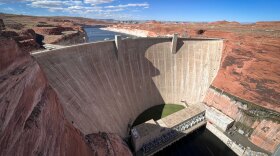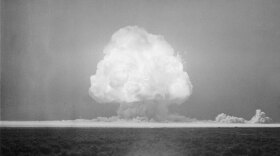-
Arizona Gov. Katie Hobbs, California Gov. Gavin Newsom and Nevada Gov. Joe Lombardo released a joint statement Saturday calling on Utah, Colorado, Wyoming and New Mexico to offer more concessions.
-
Negotiators are focusing on a five-year agreement for sharing water from the shrinking river. Experts say that would provide some much-needed flexibility.
-
State negotiators entered the meeting at a years-long impasse over how water restrictions should be managed during dry years. They now have less than two weeks until a federal Feb. 14 deadline.
-
Dozens of the 575 federally recognized Native American tribes are making it easier to get tribal IDs by waiving fees, lowering the age of eligibility and printing cards on the spot. As Native Americans rush to secure the documents, many see a bitter irony in the first people of the land having to prove that they too are U.S. citizens.
-
Water leaders in the U.S. West gathered this week in Las Vegas with a hefty task hanging over their heads — figuring out a long-term plan for sharing water from the Colorado River.
-
Utah and the 6 states that share the river missed a federal Nov. 11 deadline to make progress on a new water agreement. Gov. Katie Hobbs said she has a hard time believing the Upper Basin states can't reduce water use.
-
The Biden administration issued an order in 2023 banning new oil and gas development within 10 miles of the historic site for 20 years. Tribal leaders who had celebrated the move are now concerned about the potential for protections to be rolled back.
-
A group of nonprofits is calling for reductions to water demand, changes at Glen Canyon Dam and more transparent negotiations.
-
Two years ahead of what could be a final round of applications, allegations of predatory representation and solicitation are on the rise, and especially targeting tribal communities. The Radiation Exposure Compensation Act was reauthorized over the summer.
-
At Grand Canyon National Park, a lightning-sparked fire that started July 4 highlighted the challenges of using fire to benefit the landscape. The wind-whipped flames ended up consuming a historic lodge and dozens of other structures.
-
On July 16, 1945, the U.S. detonated the first nuclear bomb. In the years that followed, other tests led to a wave of health problems in Utah and across the West. Now, advocates are celebrating the expansion of the Radiation Exposure Compensation Act.
-
This seasonal dance choreographed by Mother Nature marks a special time for the southwestern United States and Mexico. It is when residents clasp their hands, hoping for much-needed moisture to dampen the threat of wildfire and keep rivers flowing.
Play Live Radio
Next Up:
0:00
0:00
Available On Air Stations












